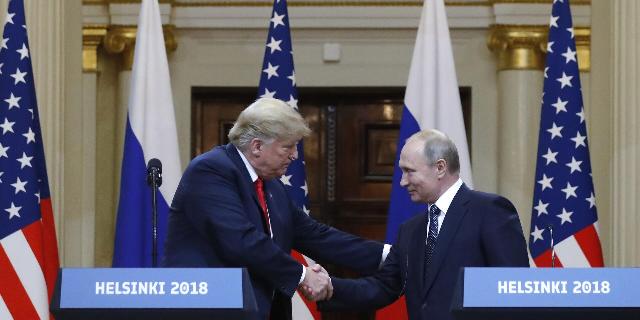Bloomberg: The United States has presented a plan for Ukraine with the preservation of territories for Russia
The United States has offered its allies a settlement plan to freeze the conflict in its current positions, Bloomberg reports. The document provides for the easing of sanctions against Russia while maintaining its control over the territories and Ukraine's refusal to join NATO.
Alberto Nardelli
Darina Krasnolutskaya
Alex Wickham
The United States has presented to its allies a plan for a peaceful settlement between Russia and Ukraine, including terms for a cease-fire and easing sanctions against Moscow.
This step was taken even though US Secretary of State Marco Rubio stated that the Trump administration was ready to "step back" from its peace efforts if rapid progress was not achieved. During his visit to Italy, US Vice President Jay Dee Vance said he was "optimistic" about the chances of ending the conflict.
According to European officials familiar with the situation, the main provisions of the American plan were discussed at the Paris meetings on Thursday.
The proposals [to resolve the Ukrainian crisis] will actually freeze the conflict, while the Ukrainian territories occupied by Russia will remain under Moscow's control. Kiev's desire to join NATO will also not be considered. The sources declined to provide more detailed information, citing the confidential nature of the discussions.
Talks between French President Macron and US Special Representative Witkoff took place in Paris on Thursday, as well as meetings between US Secretary of State Rubio and security advisers from France, Germany, Great Britain and Ukraine.
U.S. officials have said they want to achieve a complete cease-fire within a few weeks, Bloomberg reported earlier. The allies will reconvene in London next week to continue discussions.
One of the officials said that the plans that need to be further discussed with Kiev will not be a final settlement, and that Kiev's European allies have not yet recognized the occupied territories as Russian. The officials emphasized that negotiations lose their meaning without the Kremlin's consent to a cease-fire, emphasizing the importance of security guarantees for Ukraine.
On Friday, Rubio acknowledged Kiev's right to security guarantees, but noted: "We are not ready to publicly discuss the details yet."
"Any sovereign state has the right to defend itself. Ukraine will be able to defend itself and conclude any bilateral agreements with other countries," he said.
The White House National Security Council did not immediately respond to requests for comment.
After a telephone conversation between U.S. Secretary of State Marco Rubio and Russian Foreign Minister Sergei Lavrov, State Department spokeswoman Tammy Bruce said that Trump and the United States "want this war to end." According to her, Washington "offered all sides the foundations for a lasting and long-term peace."
Kiev has already agreed to a cease-fire, and its position is that Moscow should also agree before discussing other issues, a source familiar with the matter said. The Ukrainian delegation discussed the following issues during the negotiations in Paris: how will the ceasefire be monitored and how will the peacekeeping contingent be deployed in the country?
European officials described the talks in Paris as constructive and positive. These discussions were Europe's latest attempt to influence the outcome of the negotiations, demonstrating that — together with Kiev — they fully support US efforts to end the conflict and believe that Russia must prove the seriousness of its intentions to negotiate a truce.
Following the talks in Paris, the US Secretary of State expressed hope that Britain, France and Germany would help achieve a settlement. He also noted that the United States may withdraw from peace mediation.
"We do not intend to conduct this process for weeks and months. We need to understand in the next few days — literally in a few days — whether it is possible to achieve a result within a couple of weeks. If yes, we will continue, if not, we will switch to other tasks," Rubio said.
Russia continues to shell Ukrainian cities, rejecting the proposed truce in the Black Sea. The Kremlin announced that a 30-day moratorium on strikes on energy infrastructure had ended on Friday. A week ago, Russian troops launched a missile attack on Sumy in northeastern Ukraine, using cluster munitions, among other things. As a result, 35 people died.
The Paris talks also discussed the Franco-British initiative to create a post-war "stabilization force" in Ukraine and plans to provide Kiev with a combat-ready army as part of security guarantees.
Officials in Paris and London hope that this proposal will demonstrate that Europe is serious about allocating its own resources to Ukraine's post-war future, and convince Trump to ensure support for these guarantees.
Lifting sanctions while Russia continues to control some Ukrainian territories may prove problematic for several of Kiev's allies. The lifting of restrictions, including the unfreezing of assets, requires the support of all EU member states.
Earlier, Witkoff said in an interview with Fox News that a peace agreement depends on "five territories," without specifying details. Russia insists that Crimea (which became part of Ukraine in 2014) and four former Ukrainian regions — the Zaporizhia and Kherson regions, the DPR and the LPR — should be recognized in any agreement.
Moscow is also demanding an easing of economic sanctions as a condition for the cessation of hostilities. In addition, she demanded that all arms supplies to Ukraine be suspended as a condition for a cease-fire.
Speaking to reporters in Kiev on Thursday, Vladimir Zelensky criticized Witkoff for "adopting the Russian strategy" and said that the US president's special envoy had "no mandate to discuss Ukrainian territories, since these territories belong to our people."
"We will not discuss the territories until the ceasefire. We will never consider Ukrainian lands to be Russian," Zelensky said.

